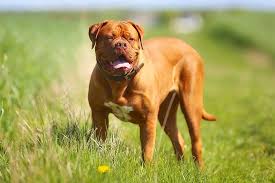
Dogue de Bordeaux
Conditions of detention
The Dogue de Bordeaux is adaptable but prefers living in a home with a yard where it can move freely. They are not highly energetic dogs but still benefit from regular exercise.
Useful Fact: They do well in apartments as long as they receive sufficient exercise and mental stimulation.
Nutrition and diet
A balanced diet rich in high-quality proteins, fats, and carbohydrates is essential for maintaining the health of a Dogue de Bordeaux. Their diet should support their large, muscular build.
Useful Fact: It’s important to feed them in smaller, more frequent meals to prevent bloat, a condition they are prone to.
Health
The Dogue de Bordeaux is prone to several health issues, including hip dysplasia, elbow dysplasia, heart problems, and bloat. Regular veterinary check-ups are crucial for early detection and management.
Useful Fact: Maintaining a healthy weight through proper diet and exercise can help reduce the risk of joint issues.
Grooming and care
The Dogue de Bordeaux has a short, fine coat that is easy to maintain. Regular brushing helps to remove loose hair and keep the coat healthy. They come in shades of fawn, from light to dark red, often with a black or brown mask.
Useful Fact: Despite their size, they shed minimally and require only basic grooming.
Education and training
Dogue de Bordeaux dogs are intelligent and eager to please but can be stubborn. They respond best to positive reinforcement and consistent training methods.
Useful Fact: Early socialization and training are crucial to prevent behavioral issues and ensure they grow into well-behaved adults.
Toys and entertainment
These dogs enjoy toys that challenge them mentally and physically, such as durable chew toys, puzzle toys, and interactive games.
Useful Fact: Providing engaging toys can help prevent boredom and destructive behaviors in Dogue de Bordeaux dogs.
Safety
Ensure your Dogue de Bordeaux is kept safe with secure fencing and supervision, especially in unfamiliar environments.
Useful Fact: Due to their size and strength, it’s important to keep them on a leash during walks to ensure control.
Accessories
Essential accessories for Dogue de Bordeaux dogs include sturdy collars, leashes, and durable toys. A comfortable, large bed and a crate are also beneficial for training and rest.
Useful Fact: A harness is often preferred over a collar for walking to prevent strain on their neck
Socialization
Early and regular socialization with people and other animals is crucial for Dogue de Bordeaux dogs. This helps them develop into confident and friendly adults.
Useful Fact: Puppy classes and regular playdates with other dogs can provide valuable socialization experiences.
Travel and Transportation
Dogue de Bordeaux dogs can travel well if accustomed to it from a young age. Use secure, well-ventilated crates or dog seat belts for safety during travel.
Useful Fact: Gradual acclimation to travel can help reduce anxiety and make trips more enjoyable for your Dogue de Bordeaux.
Behavior and psychology
Dogue de Bordeaux dogs are known for their loyalty, intelligence, and protective nature. They need regular mental and physical stimulation to stay happy and well-behaved.
Useful Fact: Providing tasks and engaging activities can help manage their high energy levels and prevent behavioral issues.
Legal aspects
Check local regulations for pet ownership, including licensing and breed-specific laws. Ensure your Dogue de Bordeaux’s vaccinations and health records are up-to-date.
Useful Fact: Some regions may have specific restrictions or requirements for owning large or protective breeds, so it’s important to be informed about local laws.


